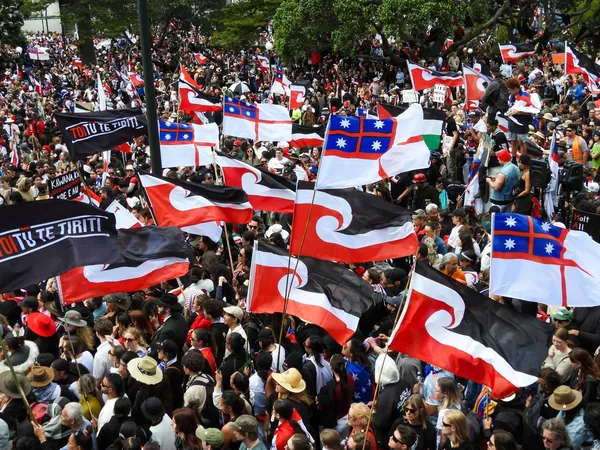
Over 40,000 Kiwis Rally Against Controversial Maori Rights Bill in New Zealand!
2024-11-19
Author: Ying
Overview of the Rally
In a powerful display of unity and cultural pride, over 42,000 people rallied outside the New Zealand Parliament on Tuesday, vehemently opposing a proposed bill that threatens the rights of the Māori population. This mass protest, ignited by concerns over the Treaty Principles Bill introduced by the libertarian ACT New Zealand party, underscores escalating tensions surrounding indigenous rights in the country.
The Hikoi
The rally follows a poignant nine-day hikoi, a traditional Māori march, that traversed the nation from its northern reaches to the capital, Wellington. Thousands participated along the way, gathering support in various towns and cities, highlighting the depth of feeling within the community. Demonstrators, clad in traditional garb—with feathered headdresses and cloaks—waved banners and carried traditional Māori weapons, showcasing a vibrant display of cultural heritage. Many wore T-shirts proclaiming 'Toitu te Tiriti' (Honour the Treaty), a message that resonates deeply with Māori activists and allies.
Concerns Over the Proposed Bill
The controversial legislation seeks to reinterpret the historic Treaty of Waitangi, a foundational document signed in 1840, which acknowledges Māori tribes' rights to their lands in exchange for governance. This treaty has been pivotal in guiding New Zealand's legal framework, with successive court rulings and a dedicated Māori tribunal expanding indigenous rights over the years. Critics argue that the proposed bill could dismantle decades of progress, potentially exacerbating societal divisions and undermining the well-being of Māori communities, who already face significant challenges, including higher rates of poverty, incarceration, and health disparities.
Political Response
While the ACT party’s coalition partners, the National Party and New Zealand First, supported the bill through its initial reading, both have since expressed their reluctance to see it enacted into law. Prominent figures, including former Prime Minister Jenny Shipley, have voiced concerns, asserting that merely entertaining the bill threatens to fracture the national unity that New Zealand seeks to uphold.
Call to Action
Protesters on Tuesday sent a clear message to lawmakers: the rights of Māori are not negotiable. The mobilization of tens of thousands not only illustrates the public's commitment to preserving Māori rights but also emphasizes the need for ongoing dialogue and respect for New Zealand's diverse cultural landscape. As the conversation around this bill continues, the question remains: Will the government heed the call of its citizens to honour the Treaty of Waitangi, or will it allow divisive legislation to reshape the rights of a vital part of its population?




 Brasil (PT)
Brasil (PT)
 Canada (EN)
Canada (EN)
 Chile (ES)
Chile (ES)
 España (ES)
España (ES)
 France (FR)
France (FR)
 Hong Kong (EN)
Hong Kong (EN)
 Italia (IT)
Italia (IT)
 日本 (JA)
日本 (JA)
 Magyarország (HU)
Magyarország (HU)
 Norge (NO)
Norge (NO)
 Polska (PL)
Polska (PL)
 Schweiz (DE)
Schweiz (DE)
 Singapore (EN)
Singapore (EN)
 Sverige (SV)
Sverige (SV)
 Suomi (FI)
Suomi (FI)
 Türkiye (TR)
Türkiye (TR)